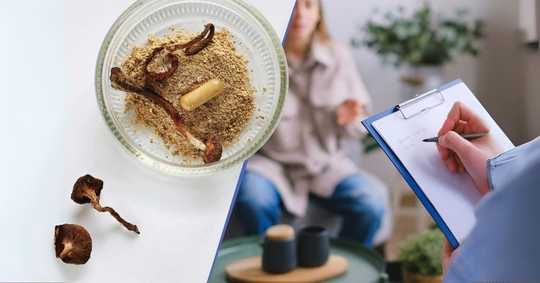Very soon, psychedelics like psilocybin and MDMA could be available to people with PTSD and depression. We have to think about optimizing the psychedelic therapy experience for people. Especially for those who are new to it. Not everyone wants to “trip”. But can we separate the experience of “tripping” from measurable mental health outcomes? Let’s Talk Subjective Experiences and Objective Outcomes.
Psychedelic therapy is about to experience a major influx in need. In this year’s wellness trend forecast, Well+Good noted that psychedelics are “poised to change the course of mental health treatment”.1 Michael Pollan’s Netflix special ‘How to Change Your Mind’ has also kicked up interest. People who may not have considered psychedelics as legitimate treatments are intrigued.
Up to the last few years, psychedelic medicine has been a fairly niche field. Some people still associate them with delinquency because of the conservative campaigns of the 60s. Public perceptions have turned the tide toward acceptance for psychedelic medicine in the last decade. But we still have a long way to go.
Psychedelic Support is a leader in education in evidence-based psychedelic education. We help…
- Connect people with therapists
- Build professional relationships
- Train providers
We’re always thinking about how we can help broaden access – for patients seeking help and clinicians seeking information.
Follow your Curiosity
Sign up to receive our free psychedelic courses, 45 page eBook, and special offers delivered to your inbox.But how can we help people who don’t want to experience the subjective effects of psychedelics? Can therapy be tailored so that these folks can still experience the mental health benefits of psychedelics? Let’s discuss what we know about separating subjective and objective effects in psychedelic therapy.
Defining Objective and Subjective Effects in Psychedelic Therapy
Let’s define our terms on the objective and subjective effects of psychedelic therapy.
- Subjective effects of psychedelics are what a person experiences during or after a psychedelic experience.
- For instance, 40-60% of people with Major Depressive Disorder on SSRIs report that their emotions feel more “blunted” or flat.2
- Researchers may try to measure subjective effects with self-reported scales. For instance, the Seven-Item Generalized Anxiety Disorder scale is used in some psychedelic research.3
- Subjective effects are a personal experience. Which means that they’re more difficult to measure than objective effects.
- Objective effects are easy to measure, and notable to outside observers.
- An objective effect of blood pressure medication is that it causes a measurable decrease in blood pressure.
- Some psychedelics, like psilocybin, have objective effects like increasing blood pressure.
- Objective effects are less personal, and can often be measured and communicated in raw numbers.
But when we talk about the subjective effects of psychedelics, what do we mean exactly? Let’s be more specific about personal psychedelic experiences.4
What Are the Subjective Effects of Psychedelics?
Depends on the substance, person, set, and setting. The psychedelic experience doesn’t happen in a vacuum. People bring their own experiences, anxieties, and preconceptions to their psychedelic therapy sessions. And therapists can have an impact on the experience by making patients feel safe and educating them before treatment.
With that said, here are some of the most common ways that people describe the psychedelic experience:
- Ego Dissolution. This is when a person becomes disconnected from who they are. Some people may lose the boundary between themselves and the outside world during a psychedelic experience. Some people even describe this as a dissolving feeling, like their molecules are fusing with the ones around them.
- Sensory distortions or hallucinations. Some people call this a “sixth sense”, or a fusion of separate senses. People may feel like they can see sounds or hear colors while on some psychedelics. Others report a distortion in their sense of time, where a few minutes feels like hours and vice-versa.
- A sense of “oneness” or spiritual connection. Some people report an intense feeling of connection to the universe or a higher power. Out-of-body experiences are also common experiences for certain psychedelics. These intense – sometimes spiritual feelings – can last long after other psychedelic effects have dissipated.
- Dissociation or disconnectedness. On the other hand, some people experience a profound disconnection from their bodies, memories, or experiences. In other words, an out-of-body experience, where people feel severed from their physical selves.
Each of these subjective effects can be powerful and terrifying for patients. Especially those who are new to psychedelics. Preparing patients for these experiences can help them avoid adverse effects, like psychedelic trauma. The psychedelic experience is individualized in nature. So there’s no one-size-fits-all template for integration therapy.
Some studies have revealed an association between how powerful a psychedelic experience is, and how therapeutic its effects are. More on this later.
First, what are the neurological phenomena behind these subjective effects? Why do psychedelics cause these one-of-a-kind experiences? Let’s discuss how psychedelics rapidly re-wire the brain.
Psychedelics as Psychoplastigens
The term ‘psychoplastigen’ refers to substances that can rapidly rewire neural connections. They do this by turning on mechanisms of plasticity – the brain’s natural way of changing and adapting. Psychoplastigens are change agents in the brain – they help our neural networks become more flexible, more quickly.
Scientists used to think that the brain stopped growing at birth and that our neural networks were set in stone. But now we know that this is far from the truth. Our brains are constantly…
- Adapting
- Reorganizing pathways
- Building new connections
- Making brand-new neurons
This is neuroplasticity, and it’s essential to our nervous systems.5
These are the two main types of neuroplasticity:
- Structural plasticity is when our brains change their physical structure after learning. For instance, the increase in grey matter volume that shows up on MRI after intense learning. Our brains adapt to what we go through, and our experiences are changing our brains.6
- Functional plasticity is when our brains adapt to damage by moving functioning to undamaged areas. For instance, people who have lost functions in specific areas because of a stroke may gain it back when a different part of the brain adapts. Rehabilitation helps this process, and reinforces these new areas with their new function.7
As psychoplastigens, psychedelics promote both types of neuroplasticity. Scholars believe that this could be why they have such potent anti-depressant effects. And it’s not just that the psychedelic experience causes neuroplasticity. Structural and functional changes continue to happen long after the subjective effects of a substance have worn off.
For instance, DMT’s half-life is about 15 minutes, yet the neuroplasticity that it sparks continues to work for hours after that.8
It’s clear that psychedelics’ effects on neuroplasticity are long-term, continuing independently of the ‘tripping’ experience. So can we separate neuroplasticity from ‘tripping’?
Can We Separate Subjective Experiences from Mental Health Outcomes?
Depends on who you ask. Two different papers came out on this subject in 2020, each with opposing views. Check out their titles:
- ‘The subjective effects of psychedelics are necessary for their enduring therapeutic effects’
- ‘The subjective effects of psychedelics may not be necessary for their enduring therapeutic effects’
Let’s talk about the conclusions of both.
The Subjective Effects of Psychedelics Are Necessary For Their Enduring Therapeutic Effects9
The authors believe that it’s impossible to separate the powerful psychedelic experience from mental health outcomes. It’s clear that neuroplasticity and serotonin receptor activation are linked to anti-depressant effects. But it’s not clear that these mechanisms can be separated from subjective effects.
The meaningfulness that people associate with their psychedelic experience is directly linked to long-term outcomes. People who rate their experiences as more mystical are more likely to have positive changes that endure for months or years.10 Deeply meaningful experiences have the power to make us change our beliefs. This may be why they’re associated with more profound change after therapy.
But what if it’s possible to separate experience from effects? Let’s talk about the conclusions from the opposing paper.
The Subjective Effects of Psychedelics May Not Be Necessary for Their Enduring Therapeutic Effects11
This article contends that patients may not need to ‘trip’ in order to experience the therapeutic benefits of psychedelic therapy. The authors argue that just because long-term outcomes are associated with profound subjective experiences –- we don’t know yet whether they cause them. While these subjective experiences may help with therapeutic responses, there are other factors that may matter more for outcomes.
These authors argue that the profound effects of psychedelics may just be a result of activating serotonin receptors in the brain. This could mean that we can separate these chemical effects from their mind-altering outcomes. If we could separate the two, this would broaden the number of people who could go through psychedelic therapy and enjoy it’s outcomes.
We need more research on sub-hallucinogenic doses to know whether or not we can offer the positive effects of psychedelics to folks who don’t want to experience ego-death. The water is still murky on this subject. We’re looking forward to more analysis of the fascinating psychedelic experience and clinical outcomes.
Separating Subjective Effects from Psychedelic Therapy: What do You Think?
As you can see, this is a contested question within the psychedelic community. Psychedelic therapists have strong feelings on this subject. It stems from their experiences with patients. We’re still searching for this answer, as the psychedelic medicine community continues to research and evolve.
Looking for resources on psychedelic therapy, integration, and research? Subscribe to our newsletter to get them directly into your inbox.
You’ll be the first to know about…
- Fresh courses
- Expert talks through our speaker series
- Hot topics within the psychedelic therapy community
Subscribe today and get access to our free courses.
References
- Prepare to hear more about psychedelics for mental health. Well+Good. (2021, December 13). Retrieved September 19, 2022.
- Ma H, Cai M, Wang H. Emotional Blunting in Patients With Major Depressive Disorder: A Brief Non-systematic Review of Current Research. Front Psychiatry. 2021 Dec 14;12:792960. doi: 10.3389/fpsyt.2021.792960. PMID: 34970173; PMCID: PMC8712545.
- Raison, C. L., Jain, R., Penn, A. D., Cole, S. P., & Jain, S. (2022). Effects of naturalistic psychedelic use on depression, anxiety, and well-being: Associations with patterns of use, reported harms, and transformative mental states. Frontiers in Psychiatry, 13. https://doi.org/10.3389/fpsyt.2022.831092
- Silverstone, P. (n.d.). What is the psychedelic experience really like? Psychology Today. Retrieved September 19, 2022, from https://www.psychologytoday.com/us/blog/the-promise-psychedelics
- Mateos-Aparicio P, Rodríguez-Moreno A. The Impact of Studying Brain Plasticity. Front Cell Neurosci. 2019 Feb 27;13:66. doi: 10.3389/fncel.2019.00066. PMID: 30873009; PMCID: PMC6400842.
- Schmidt S; Gull S; Herrmann KH; Boehme M; Irintchev A; Urbach A; Reichenbach JR; Klingner CM; Gaser C; Witte OW; (n.d.). Experience-dependent structural plasticity in the Adult Brain: How The Learning Brain Grows. NeuroImage. Retrieved September 19, 2022, from https://pubmed.ncbi.nlm.nih.gov/33164876/
- Su, F., & Xu, W. (2020). Enhancing brain plasticity to promote stroke recovery. Frontiers in Neurology, 11. https://doi.org/10.3389/fneur.2020.554089
- Ly C, Greb AC, Cameron LP, Wong JM, Barragan EV, Wilson PC, Burbach KF, Soltanzadeh Zarandi S, Sood A, Paddy MR, Duim WC, Dennis MY, McAllister AK, Ori-McKenney KM, Gray JA, Olson DE. Psychedelics Promote Structural and Functional Neural Plasticity. Cell Rep. 2018 Jun 12;23(11):3170-3182. doi: 10.1016/j.celrep.2018.05.022. PMID: 29898390; PMCID: PMC6082376.
- Yaden DB, Griffiths RR. The Subjective Effects of Psychedelics Are Necessary for Their Enduring Therapeutic Effects. ACS Pharmacol Transl Sci. 2020 Dec 10;4(2):568-572. doi: 10.1021/acsptsci.0c00194. PMID: 33861219; PMCID: PMC8033615.
- Griffiths R, Richards W, Johnson M, McCann U, Jesse R. Mystical-type experiences occasioned by psilocybin mediate the attribution of personal meaning and spiritual significance 14 months later. J Psychopharmacol. 2008 Aug;22(6):621-32. doi: 10.1177/0269881108094300. Epub 2008 Jul 1. PMID: 18593735; PMCID: PMC3050654.
- Olson, D. E. (2020). The subjective effects of psychedelics may not be necessary for their enduring therapeutic effects. ACS Pharmacology & Translational Science, 4(2), 563–567. https://doi.org/10.1021/acsptsci.0c00192






